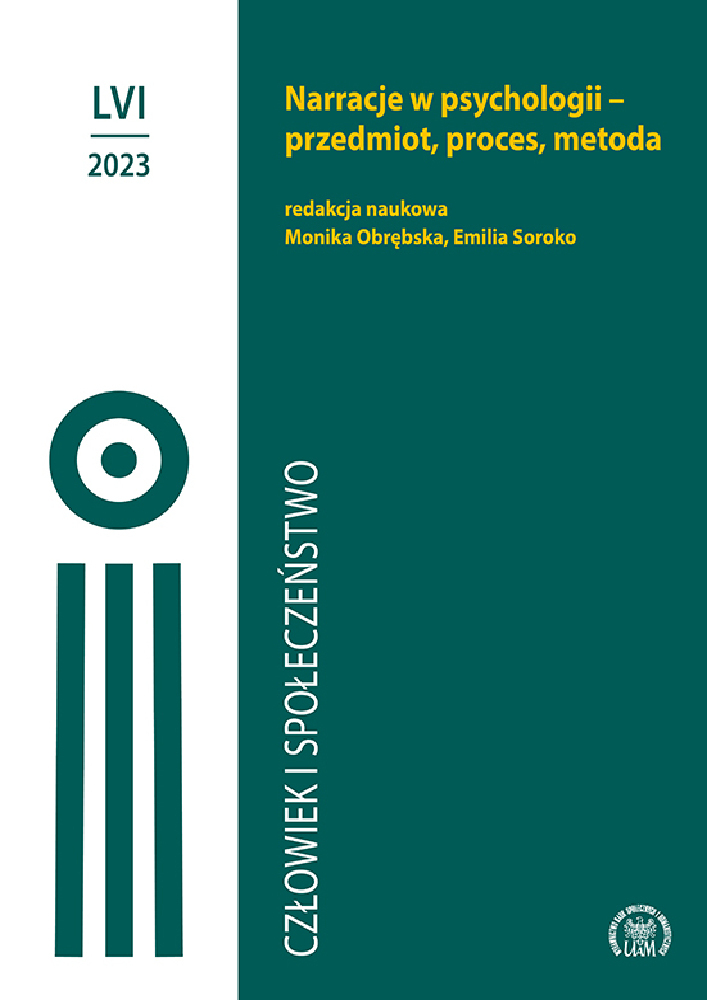Abstrakt
The thematic diversity and the way narrative is understood demonstrate the vitality of the concept and the phenomenon of narrative in psychology. This article presents some questions and dilemmas that narrative psychology, which is still a young discipline in search of its scientific identity, pose to researchers. It is not our ambition to resolve these questions; instead, we perceive them as moments of (dis)continuity in the ongoing narrative story and as markers of the directions of research and theoretical considerations. We identify such themes as the distinction between utterance and narrative, the space between author and listener, the directions in which the notion of narrative identity is expanding, and the link between narrative structure and narrative process. The methodological diversity the narrative perspective introduces allows us to pose research questions in a qualitative and quantitative approach.
Bibliografia
Angus, L., Hardtke, K. (1994). Narrative Processes in Psychotherapy. Canadian Psychology/Psychologie canadienne, 35(2), 190–203. DOI: https://doi.org/10.1037/0708-5591.35.2.190
Burzyńska, A. (2008). Idee narracyjności w humanistyce. W: B. Janusz, K. Gdowska, B. de Barbaro (red.), Narracja. Teoria i praktyka. Kraków: Wydawnictwo Uniwersytetu Jagiellońskiego.
Creswell, J.W. (2003). Research Design: Qualitative, Quantitative, and Mixed Methods Approaches. Sage: Thousand Oaks, CA.
Dryll, E., Cierpka, A. (2011). Psychologia narracyjna. Tożsamość, dialogowość, pogranicza. Warszawa: Eneteia Wydawnictwo Psychologii i Kultury.
Eco, U. (1973). Dzieło otwarte. Warszawa: Czytelnik.
Fisher, W. (2003). Paradygmat narracyjny. W: E. Griffin (red.), Podstawy komunikacji społecznej (ss. 325-337). Gdańsk: Gdańskie Wydawnictwo Psychologiczne.
Habermas, T. (2019). Emotion and Narrative. Perspectives in Autobiographical Storytelling. Cambridge: Cambridge University Press. DOI: https://doi.org/10.1017/9781139424615
Habermas, T., Bluck, S. (2000). Getting a Life: The Emergence of the Life Story in Adolescence. Psychological Bulletin, 126(5), 748–769. DOI: https://doi.org/10.1037/0033-2909.126.5.748
Hanninen, V. (2004). A Model of Narrative Circulation. Narrative Inquiry, 14(1), 69–85. DOI: https://doi.org/10.1075/ni.14.1.04han
Krajewski, M. (2017). Incydentologia. Warszawa: Fundacja Bęc Zmiana.
Kurcz, I. (2005). Psychologia języka i komunikacji. Warszawa: Wydawnictwo Naukowe Scholar.
Labov, W. (2009). Narratives of Personal Experience. W: P. Hogan (red.), Cambridge Encyclopedia of the Language Sciences. Cambridge: Cambridge University Press.
McAdams, D.P, Anyidoho, N.A, Brown, Ch., Huang, Y.I., Kaplan, B., Machado, M.A., (2004). Traits and Stories: Links Between Dispositional and Narrative Features of Personality. Journal of Personality, 72(4), 761–784. DOI: https://doi.org/10.1111/j.0022-3506.2004.00279.x
Nelson, K., Fivush, R. (2020). The Development of Autobiographical Memory, Autobiographical Narratives, and Autobiographical Consciousness. Psychological Reports, 123(1), 71–96. DOI: https://doi.org/10.1177/0033294119852574
Nycz, A., Obrębska, M. (2020). Potrzeba mitu w czasach niepewności. W: M. Obrębska, A. Pankalla (red.), Mity kultury współczesnej. Perspektywa psychoantropologiczna (ss. 65–86). Poznań: Wydawnictwo Nauk Społecznych i Humanistycznych UAM.
Obrębska, M., Kleka, P. (2016). Gadatliwość kobiet: prawda czy stereotyp? W: J. Mampe, H. Makurat, Ł. Owczinnikowa, F. Marzouk (red.), Socjolingwistyczne badania w teorii i praktyce. Ujęcie interdyscyplinarne (ss. 77–86). Gdańsk: Wydawnictwo Uniwersytetu Gdańskiego.
Rosner, K. (2006). Narracja, tożsamość i czas. Kraków: Universitas.
Salvatore, G., Dimaggio, G.A., Semerari, A. (2004). A Model of Narrative Development: Implications for Understanding Psychopathology and Guiding Therapy. Psychology and Psychotherapy: Theory, Research and Practice, 77, 231–254. DOI: https://doi.org/10.1348/147608304323112519
Schmidt, P., Fuchs, T. (2021). The Unbearable Dispersal of Being: Narrativity and Personal Identity in Borderline Personality Disorder. Phenomenology and the Cognitive Sciences, 20(2), 321–340. DOI: https://doi.org/10.1007/s11097-020-09712-z
Sharp, C., Wall, K. (2021). DSM-5 Level of Personality Functioning: Refocusing Personality Disorder on What It Means to Be Human. Annual Review of Clinical Psychology, 17(1), 313–337. DOI: https://doi.org/10.1146/annurev-clinpsy-081219-105402
Soroko, E. (2009). Wywoływanie autonarracji w badaniach psychologicznych. Ocena (auto)narracyjności wypowiedzi. Poznań: Wydawnictwo Naukowe UAM.
Soroko, E. (2014). Aktywność autonarracyjna osób z różnym poziomem organizacji osobowości. Opowieści o bliskich związkach. Poznań: Wydawnictwo Naukowe UAM.
Stemplewska-Żakowicz, K. (2002). Koncepcje narracyjnej tożsamości. Od historii życia do dialogowego „ja”. W: J. Trzebiński (red.), Narracja jako sposób rozumienia świata (ss. 81–113). Gdańsk: Gdańskie Wydawnictwo Psychologiczne.
Straś-Romanowska, M. (2010). Psychologia wobec małych i wielkich narracji. W: M. Straś-Romanowska, B. Bartosz, M. Żurko (red.), Psychologia małych i wielkich narracji (ss. 21–40). Warszawa: Eneteia Wydawnictwo Psychologii i Kultury.
Thomsen, D.K., Holm, T., Jensen, R.A.A., Lind, M., Pedersen, A.M. (2023). Storying Mental Illness and Personal Recovery. Cambridge: Cambridge University Press. DOI: https://doi.org/10.1017/9781108907606
Trzebiński, J. (2002). Narracja jako sposób rozumienia świata. Gdańsk: Gdańskie Wydawnictwo Psychologiczne.
Trzebiński, J., Czarnecka, J.Z., Cabański, M. (2021). The Impact of the Narrative Mindset on Effectivity in Social Problem Solving. Plos One, 16(7), e0253729. DOI: https://doi.org/10.1371/journal.pone.0253729
Waters, T.E.A., Köber, C., Raby, K.L., Habermas, T., Fivush, R. (2019). Consistency and Stability of Narrative Coherence: An Examination of Personal Narrative as a Domain of Adult Personality. Journal of Personality, 87(2), 151–162. DOI: https://doi.org/10.1111/jopy.12377
Licencja
Prawa autorskie (c) 2023 Monika Obrębska, Emilia Soroko

Utwór dostępny jest na licencji Creative Commons Uznanie autorstwa 4.0 Międzynarodowe.
1. W momencie złożenia pracy celem rozpoczęcia postępowania w sprawie publikacji, Licencjodawca, zwany dalej Autorem, akceptuje wszystkie zasady umieszczone na stronie internetowej czasopisma “Człowiek i Społeczeństwo”, udzielając Licencjobiorcy, zwanego dalej Wydawcą, niewyłącznej i nieodpłatnej licencji na korzystanie z Utworu. Licencja zakłada tym samym brak ograniczeń terytorialnych, czasowych oraz ilościowych na następujących polach eksploatacji (art. 50 ustawy z dnia 4 lutego 1994 r. o prawie autorskim i prawach pokrewnych):
a. utrwalanie Utworu;
b. zwielokrotnienie Utworu drukiem i w wersji cyfrowej;
c. wprowadzenie do obrotu, użyczenie lub najem oryginału/zwielokrotnionych egzemplarzy Utworu;
d. publiczne wykonanie, wystawienie, wyświetlenie, odtworzenie oraz nadawanie i reemitowanie, a także publiczne udostępnianie Utworu w taki sposób, aby każdy mógł mieć do niego dostęp w miejscu i w czasie przez siebie wybranym;
e. włączenie Utworu w skład utworu zbiorowego;
f. wprowadzenie Utworu w postaci elektronicznej na platformy elektroniczne lub inne wprowadzenie Utworu w postaci elektronicznej do Internetu, Intranetu, Extranetu lub innej sieci;
g. rozpowszechnianie Utworu w wersji elektronicznej w Internecie, Intranecie, Extranecie lub innej sieci, w pracy zbiorowej, a także samodzielnie w formule Open Access w oparciu o licencję Creative Commons Uznanie autorstwa 4.0 Międzynarodowa Licencja Publiczna (CC BY 4.0), a także inną wersję językową tej licencji, lub którąkolwiek późniejszą wersję tej licencji.
2. Założenia licencji Creative Commons Uznanie autorstwa 4.0 Międzynarodowa Licencja Publiczna (CC BY 4.0), udzielają Wydawcy upoważnienia do kopiowania, zmieniania, rozprowadzania, przedstawiania i wykonywania Utworu jedynie pod warunkiem uznania autorstwa.
3. Wraz z dostarczeniem Utworu, Autor zobowiązuje się do wypełnienia, podpisania oraz odesłania skanu umowy

